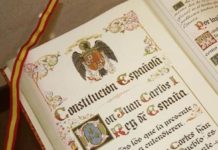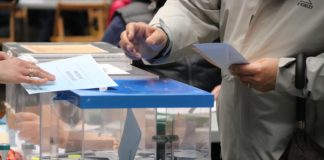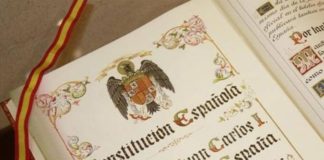Having its own educational system and total autonomy to design the educational curriculum is a characteristic sign of sovereign national communities. And it must also be one of the main objectives of any political independence movement. There is no doubt that states, through the school, seek not only the personal development and future professional training of students but also to develop a sense of national belonging. And that happens everywhere, here in the Basque Country, in Spain, in Sweden or in Singapore. Because when it comes to national feeling, there is no neutral or “aseptic” educational system. And because education always transmits concrete and determined values.
Indeed, through school, students socialize in a specific language and culture, learn a specific history, geography and literature, and share common referential areas. That is, they learn to identify with a concrete and particular national community. For this reason, it is vital for stateless nations like ours to have their own educational system, to guarantee the survival of our language and our culture, and to guarantee our own survival as a nation. Historically, we have always been denied this Basque school system and the survival of the current system of linguistic models is a reflection of this (there are three linguistic models in the Western Basque Country[1]: one in Basque only, one bilingual and the other in Spanish only). The educational projects of France and Spain have historically always sought the denationalization of Euskal Herria (Basque Country), and the assimilation of the Basques into the Spanish or French cultural framework.
The Government of the western part of the Basque Country wanted to process a new Education Law during the previous legislature. It was proved not possible and so was left for the current legislature. NAZIOGINTZA has obtained and examined this draft of the new law that the Government of the Western Basque Country has prepared and sees that it has great shortcomings. We will discuss this later.
OUR MODEL:
Euskal Herria needs a Basque national school system, an autonomous and sovereign educational framework. Of course, we would like this educational system within an independent Basque Republic but given the difficulties to achieve this in the short term, we believe that it would be possible right now to have our own educational system (at least in the South of the Basque Country[2]) still without political independence. It would be enough to have the exclusive powers in Education that other territories have, such as Flanders.
From a Basque nationalist perspective, in our opinion these should be the pillars of this Basque national school system:
BASQUE-SPEAKING: A school that works through Basque and that makes the Basque language the central axis of teaching. Also that its objective is to achieve active Basque-speakers, since the objective is not only to teach through Basque but to make Basque the first language of the students, to achieve an active link between the students and the language, that is, to make Basques — in the broader sense of the verb — of students. Faced with the current model which creates passive Basque-speaking students, the Basque national school must show a firm commitment to our language and establish as a strategic objective that all students become active Basque-speakers.
For this, of course, it is necessary to implement a single linguistic model, entirely in Basque, a model that will also make room for other foreign languages but without this representing any harm to our language.
At the end of the compulsory education stage, all students must achieve the B2 level in Basque Language. And at the end of higher education, the objective will be to achieve level C1.
NATIONAL: The Basque national school that we want must spread throughout all the territories of the Basque Country, beyond the administrative and political borders that currently divide our Country. Today, only the network of “ikastolas”[3] covers the entire territory of Euskal Herria. Even so, and taking into account the current political reality, we believe that the educational system of the Western Basque Country should reflect that the Basque Country is a single Country, although today it is divided into five different administrations. This is how it should appear in all the contents of the school curriculum
On the other hand, this national perspective should make it possible to strengthen relations with other Basque schools outside the Western Basque Country. A solidarity network should be created to help Basque schools in areas where Basque does not have official language status.
COMMITTED TO BASQUE CULTURE: A Basque-speaking school is not enough. In addition to this, the Basque national school must also guarantee the transmission of Basque culture. Today it is possible to receive an education in Basque but with little presence of Basque culture. In addition to language, we Basques also share common elements, a special way of seeing the world, and this is reflected in our customs, in our lifestyle, in our folklore, in our myths and in our symbolic world. The elements that make us Basques constitute a national community must be referential in the school.
COMMITTED TO AN OWN CURRICULUM: The educational contents are to a great extent universal (Mathematics, Physics, Biology …), certainly, but they are inserted in local referential spheres. Regarding the content related to language or culture (Literature, History, Geography …), the current educational system does not guarantee its correct learning, since its field of reference is often Spanish or French, so it cannot be said that our students, even those of model D (entirely through Basque) and those from the most Basque-speaking areas of the country, develop good training in Basque topics. For example, many of them know who Cervantes was, but they do not know Beñat Etxepare. The Basque curriculum in our educational centers is very sparse, and it seems to us essential that the Government of the Western Basque Country should have all the powers to design said curriculum.
The Basque national school must achieve the cohesion of the Basque Country from a national point of view. And for this it is essential to take into account the four factors that we have mentioned above.
TRAINING TOTALLY THROUGH BASQUE LANGUAGE, AN UNRENOUNABLE OBJECTIVE:
The education laws (of 1981 and 1993) of the Western Basque Country (WBC), despite proclaiming linguistic equality, placed Basque in a position of inferiority. And furthermore, they have not fulfilled their objective when it comes to the Basque language. Today the three linguistic models are still in force (model A, through Spanish, model B, bilingual, and model D, through Basque), although it has been shown that models A and B do not help students to learn Basque well. And in some cases, model D does not work either, because sometimes it is a false model that conceals a model B in reality. Despite the fact that the Basque education law says that at the end of compulsory education, all students in the Western Basque Country must know the two official languages (Basque and Spanish), in practice that does not happen. And despite the fact that the law is not being followed, nevertheless our politicians maintain the three linguistic models … … It is evident that with regard to Basque, they do not exhibit the same interest in complying with the law as they do in complying with the foreign Spanish law in other areas.
The numbers do not deceive: in 2017, upon finishing compulsory education (age 16 years), 46% of WBC students did not achieve B2 level in Basque (among them, neither did some who had studied in model D). And this taking into account that the WBC is the Community that in the Spanish state allocates the most money to education, the one with the least school failure, and the one with the fewest repeating students, behind only the Eastern Basque Country (Navarra). But when it comes to the Basque language, the educational system fails.
We have analyzed the draft of the new Education Law of the Western Basque Country and we observe that it uses confusing language in relation to the linguistic model: “Our educational system must be multilingual, of quality, equitable, inclusive and innovative, taking as its axis the Basque language“. This is not enough, it is necessary to clearly define “taking as its axis the Basque language” as a MODEL OF IMMERSION IN BASQUE. And taking into account how expensive it is to take steps to recover the Basque language, it is scary to think what could happen if, in addition to Basque, the model also proposes multilingualism, which represents fewer hours for the use of our language at school.
The draft recognizes that with the current system, learning Basque is not guaranteed: “The results indicate that, with exceptions, languages are not learned well”…. “Although there have been great achievements in the development of training in the Basque language, the latest evaluations indicate that the level of the students has dropped somewhat.” And what is proposed to fill those gaps? Well, the draft does not propose anything in particular to prevent that from happening.
We know that school alone is not enough for our young people to master Basque. In addition to school, family transmission of the language is very important: It has been demonstrated that those who use the Basque language the most are those whose mother tongue is Basque (in another article we will have to comment on how little Basque institutions invest to promote family transmission of the language). The environment is also important. For this reason, it is vital that after-school activities are also provided in Basque. The Basque Government’s draft does highlight the importance of the latter, which is to be welcomed.
Finally, we have always said that languages are not just simple communication tools: languages are much more, they are the elements that give us individual and collective personality. The Basque language makes us a nation. Well, the draft of the WBC Education Law admits that our young people have a modest fidelity to the language: “But the development of the language cannot be separated from the attitude. Reports show that in recent years many young Basque-speaking people have a weak linguistic awareness. It is essential to be aware that Basque is still a minority language, which must be protected, and to reflect on it. On the other hand, it has been observed that many young people who have learned Basque have not developed a feeling of attachment to the language ”. So it is. And this happens, in our opinion, because the current educational system does not work on affective adherence to the language. Because in most of our schools our language is given a PURE INSTRUMENTAL VALUE. Because they have turned Basque into an “aseptic” language devoid of feeling. The relationship between language and identity has not been worked on, and the Basque language has not been given an affective value. And this is essential (especially in the most Spanish-speaking areas of our country) to guarantee fidelity to the language. Our language cannot be given the same treatment in our classrooms as a foreign language (for example, English).
On the other hand, we cannot forget that among the causes of low fidelity to the language is the principle of bilingualism: our students and citizens in general are offered a choice between two languages, this choice being unequal, since one of the languages is hegemonic and the other optional. We know that this asymmetry is based on the fact that one of the two languages has privileges and advantages, that is, to live in the Basque Country, Spanish and French are necessary, and Basque is not. Therefore, in addition to being faithful to the language, our students must realize that to live in the Basque Country it is NECESSARY for them to know Basque. For this, within the linguistic policies in favor of the Basque language, a clear commitment must be made to a national and Basque-speaking educational system.
The second part of this article, here: https://www.naziogintza.eus/en/about-the-basque-national-school-part-2/
[1] Three of the four Basque provinces inside the Spanish state form one ‘Autonomous Region’ with its own government, whilst the fourth, Nafarroa/ Navarra, has the status of another such region and a separate government
[2] “Hegoalde” – the “Southern Country”, i.e the four provinces currently ruled by the Spanish State (but excluding “Iparralde”, the “Northern Country”, the three remaining provinces currently under French rule).
[3] Schools teaching through the medium of the Euskera, the Basque language. https://en.wikipedia.org/wiki/Ikastola

![IMG_4188-800x533[1]](https://www.naziogintza.eus/wp-content/uploads/2021/03/IMG_4188-800x5331-696x464.jpg)




